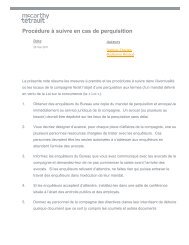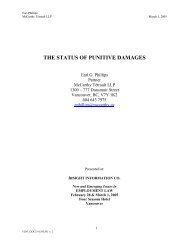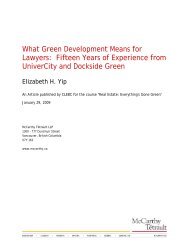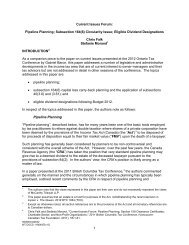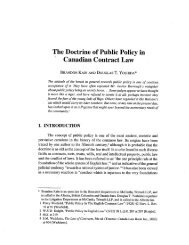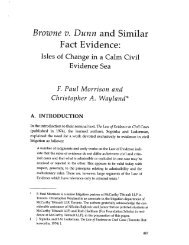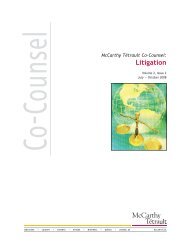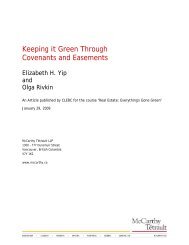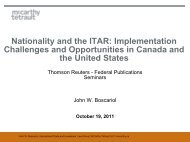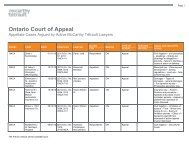1. COMPETITION - McCarthy Tétrault
1. COMPETITION - McCarthy Tétrault
1. COMPETITION - McCarthy Tétrault
Create successful ePaper yourself
Turn your PDF publications into a flip-book with our unique Google optimized e-Paper software.
The GI Act provides for registration of a Geographical Indication and the<br />
authorized user thereof who is able to bring an action based on the<br />
registration.<br />
Registration of a Geographical Indication entitles the registered proprietor<br />
and authorized users to the exclusive right to the use of the Geographical<br />
Indication in relation to the goods in respect of which Geographical<br />
Indication is registered, the right to obtain relief in respect of the<br />
infringement of the Geographical Indication. Two or more authorized users<br />
of a registered Geographical Indication have co-equal rights.<br />
The registration of Geographical Indication is valid for a period of ten<br />
years, and may be renewed thereafter for further periods of ten years. The<br />
registration of an authorized user is valid for the earlier of ten years or on<br />
the date when registration of Geographical Indication, with respect to<br />
which the authorized user is registered, expires.<br />
The GI Act prohibits assignment, transmission, licensing, pledge,<br />
mortgage, or any such other agreement with respect to a Geographical<br />
Indication. The Act also provides for infringement and passing off actions,<br />
thus recognizing the common law right in a Geographical Indication, and<br />
includes civil as well as criminal remedies. Infringement has been defined<br />
to include unfair competition. Available remedies in a civil suit include an<br />
injunction, discovery of documents, damages or accounts of profits,<br />
delivering-up of the infringing labels, and indications for destruction or<br />
erasure.<br />
For more information please contact: vaibhav@nishithdesai.com<br />
INDIA<br />
SUPREME COURT CLEARS<br />
TELECAST OF KARISHMA<br />
Originally scheduled to be launched on 12th May 2003, Rupees One<br />
Billion, mega-serial Karishma: The Miracle of Destiny (the "Karishma") was<br />
telecast on Sahara Manoranjan after a 105-day delay on 25th August<br />
2003.<br />
Sahara Media Entertainment Ltd.'s (the "Sahara") 12th May launch of<br />
Karishma was brought to an unexpected halt just four days before its<br />
telecast. On 7th May 2003 - in a suit in which best selling romance novelist<br />
Barbara Taylor Bradford alleged copyright infringement of her book "A<br />
Woman of Substance" (© 1979) - the Single Judge Bench of the Calcutta<br />
High Court issued an ex-parte injunction order prohibiting the telecast of<br />
Karishma. The allegation of copyright infringement was based on an<br />
alleged statement by the film's producer, made during an interview, that<br />
Karishma was inspired by "A Woman of Substance."<br />
On Monday, 12th May 2003, flurries of appeals were brought. The Single<br />
Judge Bench refused Sahara's application for vacating the injunction. On<br />
the same day, on appeal by Sahara, the Division Bench of the High Court<br />
allowed the telecast of Karishma. Later that day, on Bradford's appeal, the<br />
Vacation Bench of the Supreme Court stayed the airing of Karishma by an<br />
ex-parte order. In the next hearing, the Supreme Court stayed the<br />
proceedings that had been brought before the High Court and restrained<br />
airing of Karishma until a decision was made as to Bradford's Petition. On<br />
19th May 2003, the Supreme Court remanded the matter to the Single<br />
Judge Bench of the High Court.<br />
Thereafter, in the High Court, Sahara contended that Karishma was based<br />
on a work entitled "parajita," by Sachin Bhaumick. Furthermore, he said<br />
that, apart from the rags-to-riches theme, there was no similarity between<br />
Karishma and Bradford's novel, and that only substantial similarity of<br />
thought, sequence, and expression could be termed as infringement and<br />
not mere similarity in idea, concept, or central theme.<br />
On 30th June 2003, the Single Judge Bench vacated the injunction granted<br />
on 7th May 2003, with a direction to begin the telecast on 7th July 2003.<br />
Bradford promptly challenged this order before the Division Bench, which<br />
ruled to extend the injunction until further hearings could take place, and<br />
directed Bradford to submit a copy of her book.<br />
Sahara submitted to the Division Bench that one of its business rivals was<br />
instrumental in filing suit against Karishma. Producer Akashdeep Sabir's<br />
counsel contested that during an interview his client had stated that the plot<br />
of Karishma had been copied from Bradford's book.<br />
On 21st July 2003, after considering the evidence, the Division Bench<br />
permitted the telecast of Karishma: A Miracle Of Destiny, dismissed<br />
Bradford's appeal, and refused to grant a stay of operation on its order as<br />
prayed for by Bradford. The Division Bench observed that the interview<br />
conducted by Pammi Somal shows, by its internal evidence, that<br />
Akashdeep Sabir, had not read the book by Bradford. Rather, in the<br />
interview Sabir had admitted to borrowing only the plot and some<br />
characters. Therefore, the Division Bench observed, "Copyright<br />
infringement cannot be established on this alone. No prima facie case has<br />
been made. Infringement can be established only by comparing and<br />
showing similarity of details, events, situations, expressions of language,<br />
and imagination. Learned leading Counsel of both sides had not even read<br />
the book. How can infringement be established when even the book had<br />
not been read" (RG Anand v/s Deluxe Films, decided by the Supreme<br />
Court was relied upon). The Division Bench also observed the balance of<br />
convenience and considered Sahara's contention that they had spent over<br />
Rupees One Billion and taken Rupees One Hundred and Ten Million from<br />
advertisers. The Division Bench observed "plaintiffs will hardly suffer any<br />
loss of value of their book; if an injunction is obtained after 15/20 episodes<br />
(assuming there is going to be an infringement), the plaintiffs will get<br />
practically their full relief, and the respondents will be in almost equal<br />
problems as not starting at all. The balance of convenience heavily favors<br />
the respondents." The Division Bench further observed that Bradford's<br />
interlocutory application was premature. Bradford was ordered to pay<br />
heavy costs to Sahara.<br />
If after watching Karishma, Bradford can in fact establish infringement, it<br />
appears from the order of Division Bench that she is free to move the High<br />
Court once again to pray for an injunction. The Division Bench observed<br />
that "If 15-20 episodes are shown, then details of similarity can be<br />
established; the plaintiffs might, "have a prima facie case then; they have<br />
none now."<br />
On 21st July 2003, Bradford moved the Supreme Court challenging the<br />
High Court order. On 4th August 2003, the Supreme Court dismissed<br />
Bradford's Petition, but set aside the order imposing heavy costs and<br />
damages on her.<br />
Perhaps the tortuous destiny of Karishma might have been curtailed if the<br />
two stories had been read sooner to determine whether there was in fact a<br />
copyright infringement.<br />
In suits based on copyright infringement, rival works should be examined at<br />
the earliest possible opportunity to ascertain whether a prima facie case for<br />
infringement is established. Since copyright exists in the expression of an<br />
idea and not in the idea itself, close comparison of "expression" is<br />
necessary to ascertain whether at least a prima facie case is made out.<br />
Balance of convenience and comparative hardship are also factors to be<br />
taken into consideration while granting or refusing interim injunction.<br />
In India, where civil litigation can take approximately 10 to 12 years to be<br />
final, the fate of parties in intellectual property infringement matters is<br />
ISSUE 22 SEPTEMBER – OCTOBER 2003 8



